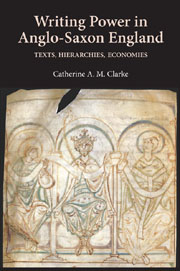Book contents
- Frontmatter
- Contents
- Acknowledgements
- Abbreviations
- Introduction
- 1 Order and Interlace: the Guthlac Poems of the Exeter Book
- 2 Sites of Economy: Power and Reckoning in the Poetic Epitaphs of the Anglo-Saxon Chronicle
- 3 ‘Absens ero … presens ero’: Writing the Absent Patron
- 4 Power and Performance: Authors and Patrons in late Anglo-Saxon Texts
- 5 Remembering Anglo-Saxon Patronage: the Libellus Æthelwoldi Episcopi and its Contexts
- Afterword
- Bibliography
- Index
- ANGLO-SAXON STUDIES
2 - Sites of Economy: Power and Reckoning in the Poetic Epitaphs of the Anglo-Saxon Chronicle
Published online by Cambridge University Press: 05 February 2013
- Frontmatter
- Contents
- Acknowledgements
- Abbreviations
- Introduction
- 1 Order and Interlace: the Guthlac Poems of the Exeter Book
- 2 Sites of Economy: Power and Reckoning in the Poetic Epitaphs of the Anglo-Saxon Chronicle
- 3 ‘Absens ero … presens ero’: Writing the Absent Patron
- 4 Power and Performance: Authors and Patrons in late Anglo-Saxon Texts
- 5 Remembering Anglo-Saxon Patronage: the Libellus Æthelwoldi Episcopi and its Contexts
- Afterword
- Bibliography
- Index
- ANGLO-SAXON STUDIES
Summary
What is an epitaph? Whilst agreeing on its ‘complicated generic status’, which evolves and adapts across historical periods and contexts, a number of recent studies have advanced arguments for defining the epitaph as a literary form and identifying its key elements. Scott Newstok, in his study of epitaphic writing in early modern England, suggests that the ‘here-ness’ of the epitaph is central, its ‘locative declaration’ forming the ‘core statement’ of all writing within the tradition, whether inscribed on the tomb itself or ‘re-cited and re-sited’ in other literary contexts. Joshua Scodel regards brevity and ‘economy’ as major features of the epitaph, stemming from its origins in inscriptions on stone but continuing as the genre develops into a literary genre in its own right. The Encyclopaedia of the Middle Ages also traces the epitaph's movement from literal inscription upon the tomb to an ‘autonomous’ literary genre, with verse epitaphs in particular ‘more frequently found transcribed in manuscripts than actually engraved’. For Anne Carson, examining the origins of the epitaphic tradition in the work of Simonides of Keos alongside modern interpretations in twentieth-century poetry, the dynamics of exchange and reciprocity are fundamental. She argues that what the early classical epitaph ‘contribute[s] to our style of thinking and talking about death is a central shaping metaphor: the metaphor of exchange’. The reader plays a pivotal role in the series of interpretative and moral transactions initiated by the epitaph text: in the classical period the inscription seeks to ‘guarantee a future exchange of oblivion for memory and purchase a moment of life’ through the reader's attention.
- Type
- Chapter
- Information
- Writing Power in Anglo-Saxon EnglandTexts, Hierarchies, Economies, pp. 44 - 79Publisher: Boydell & BrewerPrint publication year: 2012



